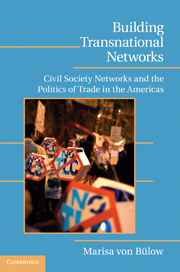Book contents
- Frontmatter
- Contents
- List of Figures
- List of Tables
- Acknowledgments
- Part One Civil Society Organizations and Their Pathways to Transnationality
- Part Two The Politicization of Trade
- Part Three The Dynamics of Networks
- Part Four Organizational Pathways to Transnationality
- 7 THE CREATION AND DEMISE OF TRANSNATIONAL COALITIONS
- 8 DIFFUSION AND DIFFERENTIATION OF NATIONAL COALITIONS
- Part Five The Search for Ideational Pathways
- Main Abbreviations Used
- Appendix A Lists of Interviews
- Appendix B Social Network Questionnaire (United States)
- Bibliography
- Index
7 - THE CREATION AND DEMISE OF TRANSNATIONAL COALITIONS
Published online by Cambridge University Press: 05 October 2010
- Frontmatter
- Contents
- List of Figures
- List of Tables
- Acknowledgments
- Part One Civil Society Organizations and Their Pathways to Transnationality
- Part Two The Politicization of Trade
- Part Three The Dynamics of Networks
- Part Four Organizational Pathways to Transnationality
- 7 THE CREATION AND DEMISE OF TRANSNATIONAL COALITIONS
- 8 DIFFUSION AND DIFFERENTIATION OF NATIONAL COALITIONS
- Part Five The Search for Ideational Pathways
- Main Abbreviations Used
- Appendix A Lists of Interviews
- Appendix B Social Network Questionnaire (United States)
- Bibliography
- Index
Summary
As an increasingly wide spectrum of civil society organizations (CSOs) began to debate how they could coordinate actions to challenge free trade agreements, there was a glaring lack of blueprints available for coalition building across groups, sectors, and national boundaries. Previous transnational arrangements in the Americas were in the main specific to categories or types of organizations, such as international labor or religious organizations, with few intersections among them. These initiatives were institutionalized in hierarchical and territorial terms, as national organizations became affiliated with international bodies.
Trade-related coalition-building efforts in the Americas led to the emergence of a new repertoire, which built upon but extrapolated from preexisting initiatives, bringing about a constellation of new and old organizational pathways to transnationality. As noted in Chapter 2, the process of coalition building is not linear. Organizations do not necessarily become more international through time. Furthermore, there is no deterministic trend leading CSOs from intermittent participation to adhering to more sustained organizational pathways.
To capture these dynamics, this chapter analyzes the process that led to the creation of hemispheric coalitions on trade. Chapter 8 complements this analysis by focusing on the creation of trade coalitions in Brazil, Chile, Mexico, and the United States. The main argument is that actors have built organizational arrangements that are influenced by previous social networks and coalitions, but that these have been rearranged through the creation of new ties and efforts to balance power relations, the diffusion of successful experiences and their adaptation in new environments, and the creation of brokerage roles that link the national and transnational scales.
- Type
- Chapter
- Information
- Building Transnational NetworksCivil Society and the Politics of Trade in the Americas, pp. 117 - 130Publisher: Cambridge University PressPrint publication year: 2010



